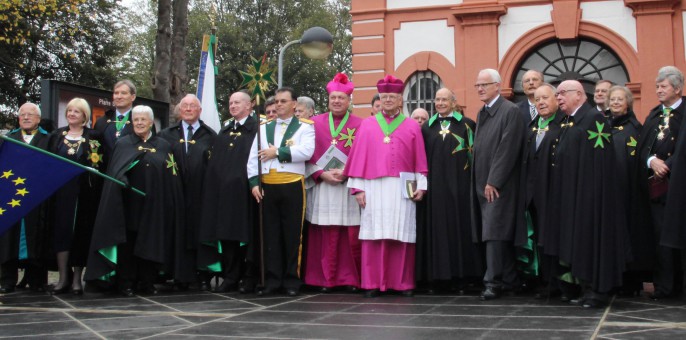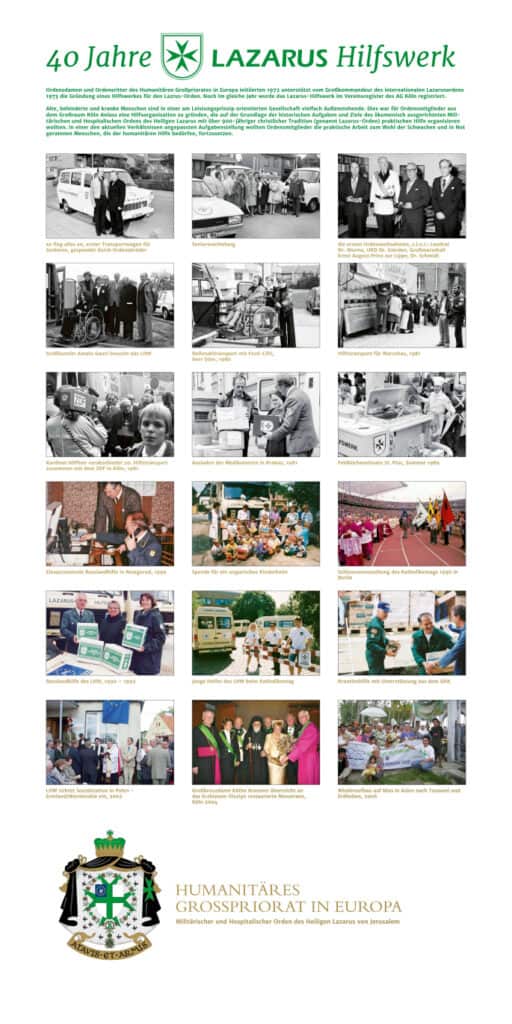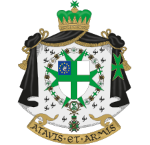
HUMANITARIAN GRAND PRIORY OF EUROPE
40 Years of Service
For their many years of humanitarian work in the Lazarus-Hilfswerk/Humanitarian Grand Priory Europe and beyond, Knights of Saint Lazarus Dr. Bernhard Worms (from Pulheim), Dr. Karlheinz Gierden (Frechen), and John Ruland (Cologne) have been awarded the distinguished „Knight’s Cross of Merit with Star“ by the ecumenical Christian Military and Hospitaller Order of Saint Lazarus of Jerusalem.
This renown and ancient Order was founded in 1098, in Jerusalem, though its hospitaller origins date to even earlier times., when the Abbey of Brauweiler already existed.
The honors were presented at Brauweiler Abbey by the Order’s Grand Chancellor, Chevalier Edward B. White, on behalf of the Grand Master His Excellency Don Carlos Gereda de Bourbon, the Marquis of Almazan. These Crosses of Merit were presented during the 40th anniversary celebrating the founding of the operational arm Lazarus Hilfswerk (LHW) of the Humanitarian Grand Priory of Europe (HGP-EU). The anniversary event was held at the 900 year-old former Benedictine Abbey “Brauweiler,” near Cologne. The Abbey is also the historical place where the members of the Order of the in the early 1970’s to found the LHW as the Orders Volunteers -Organization.
Originating as a free transport service for the disabled in the Cologne area, the LHW uniformed volunteer mission expanded to include such mobile social support services such as meals on wheels, nursing clinics and in-home services, youth services, and even senior residential care at five German Lazarus Houses.
In 1980, there was a new challenge. The supply of emergency aid to Poland required rapid mobilization to deliver large food and drugs shipments throughout Poland. LHW’s 38-ton tractor trailer rigs performed this mission continuously for over ten years. Arriving several times weekly in Poland, a total of more than 28,000 tons of humanitarian supplies were delivered to countries throughout the former Eastern Bloc, including Poland. Encountering chikaneries and difficulties at the GDR’s border was not uncommon.
The first Lazarus Hilfswerk aid shipments went in early 1981, departing Brauweiler to arrive in Upper Silesia (Katowice) and Krakow. Other early aid shipments went to the Archdiocese of Krakow at its Benedictine Monastery at Tyniecz, which coincidentally had a history closely linked to the Brauweiler Abbey. Other LHW deliveries arrived at Warmia and Mazury and all Dioecess in Polenad. Later respectively in the cities of Elbing (Elblag) and Olsztyn (Olsztyn). Lazarus-care nurses supported 8 welfare centers in Poland, taking care of sick patients by also providing in-home (outpatient) hospice care.
LHW’s success continued to expand the Order’s mission as a trusted deliverer of vital humanitarian NGO services. In 1991, a LHW coordination office for assistance to Russia was established in Novgorod during the terrible famine that struck that country. Via its own specially built, dedicated satellite radio network, LHW organized food shipments to Russia, which were sent from most of Europe’s countries. Working on behalf of the European Community, LHW delivered over 21,000 tons of food to St. Petersburg and Moscow, alone.
In Poland and Hungary humanitarian relief was later expanded by the establishment of a social station network. Lazarus focused supplies on all dioceses in Poland, delivering badly needed food and drugs. This was done in close cooperation with local churches through the Charitable Commission of the Polish Bishops‘ Conference. Having proven its successful aid model, in the following years these types of services were requested by many other countries. LHW’s resulting expansion provided a catalyst for improved interaction within the Order’s Christian membership while also enjoying closer cooperation with the Red Cross.
As noted by His Excellency the Chevalier Klaus-Peter Pokolm GCLJ, Grand Prior of the Humanitarian Grand Priory Europe, the Order has existed for 900 years and today continues in its original hospitaller role. This has been proven by the successes of Chev. Bernhard Worms and Chev. Dr. Gierden, whom together delivered and erected a complete, pre-fabricated church to what is now known as the Russian territory of Kaliningrad. This church was donated by Bishop of South-Germany, and today is found in Kaliningrad’s downtown city center.
Other successes emerged from the Order’s Eastern Europe humanitarian operations. Grand Prior Pokolm, along with the former city manager of Hürth, Dr. Rogge, implemented a town-twinnig projetc between Huerth (Cologne) and Skawina (Cracow) that continues to this day. This relationship was further cemented by the participation of the Archbishop of Krakow, Cardinal Macharski, with the former Archbishop of Cologne, Cardinal Hoeffner. LHW quietly enabled the Church’s endorsement overseen by Grand Prior Pokolm. This was a significant achievement especially as it began during the times of the previous era when Western relationships were discouraged by Poland’s insular and suspicious communist party.
Honors and Decorations Awarded
Also honored with the rarely awarded Lazarus Medal of Merit during the investiture ceremony held in the Abbey’s Church, District A.D. Klaus Lennartz (Hürth) was noted for his dedicated, excellent help during LHW’s humanitarian mission to Russia. Three postulants took the Christian loyalty oath and gave their promise to serve the religious and charitable activities of the Order. It was officially announced that the Chairman of the Gold Kraemer Foundation (GKS), Johannes Ruland, former Chancellor of the Herditary Commandry Rhineland also was awarded with the distinguished Knight’s Cross of Merit, but he could not appear for personal reasons.
For their many ideas, active involvement, and other forms of assistance – especially for facilitating effective networking with other social organizations and institutions – as part of LHW, especially mentioned were our chivalric humanitarian leaders: Dr. Bernhard Worms KLJ; Dr. Karlheinz Gierden KLJ; the founding-couple of the Gold Kraemer Foundation (GKS) Lady Kate DGCMLJ and Great Crusader Paul R. Kraemer GCMLJ; and, current GKS CEO John Ruland KCLJ; to whom we are all eternally grateful. They all have significant roles that ensured our continued success, since that first long-ago opening (in 1974) of outpatient and inpatient care facilities in the Rhineland. Through their active and dedicated involvement LHW quickly implemented transport for the disabled – this, while other NGOs idly discussed only the necessity and organization of such charity.
For over 40 years, Dr. Worms and Dr. Gierden have remained closely connected with the Order of Saint Lazarus – an Order that is as old as Abbey Brauweiler. The ceremony took place in the context of Ordensjubiliäums, and in the presence of representatives from almost all European religious denominations – mainly from the many former Eastern bloc countries in which the Lazarus Fund has in the past, or still today, provides humanitarian aid.
Some 50 singers of the Royal Netherlands all-male, award-winning Choir „Oranje“ framed the occasion with beautiful songs that complemented the investiture ceremony. The Church’s and choir together made for a particularly festive setting. The anniversary’s celebratory worship services, and the honors presented by now ancient and time-honored chivalric tradition, were an unforgettable experience.
Guided Tour by Chevalier Dr. Gierden
In the afternoon Chevalier Dr. Gierden, the father of the restoration of the Brauweiler Abbey invited all participants for an intersting giuded tour through the historic building . In his lecture about the development during over 900 years history he underlined the importance of the abbey as Rhenish cultural site, which since a few years is open for the public as cultural center,
The Abbey founded and endowed in 1024 by Pfalzgraf Ezzo, count palatine of Lotharingia of the Ezzonian dynasty and his wife Matilda of Saxony, a daughter of Emperor Otto II and Theophano.
The present abbey church, now the parish church of Saint Nicholas and Saint Medardus, is the third building on the site, built between 1136 and 1220 or later. The abbey was dissolved in the secularisation of 1803. The premises were subsequently used, under a Napoleonic law, as a hostel for beggars, and from 1815 under the Prussian regime as a workhouse.
From 1933 to 1945 the buildings were used for the internment, torture, and murder of political and social „undesirables“ by the Gestapo and the civil authorities of the Nazi government. Prisoners included Konrad Adenauer, the former mayor of Cologne and first Chancellor of the Federal Republic of Germany.
From 1945 to 1949, it was an open camp for displaced persons administered first by the British Army and then by UNRRA (United Nations Relief and Rehabilitation Administration). The abbey buildings are now used by the „Rhenish Department for the Care of Historic Monuments“.
The Grand Priory’s Aid to Christian Syria
The Order’s awards were given as official thanks after many years of fraternal cooperation in providing humanitarian excellence to those most in need. The honorees are particularly noted as they will continue to promote the Order’s humanitarian operations, as their already four decades of service has proven. To this end, A.D. Minister President Dr. Rüttgers, accompanied by spontaneous support from the clergy present, mentioned the appeal from our Order’s Spiritual Protector His Beatitude Patriarch Gregorios III (today based in Damascus) who requested urgent assistance for 8,000 Christian refugees in Syria.
As he has traditionally done, SS. Patriarch Gregorios III wanted to come to the Investiture at Brauweiler. However, he could not attend as at the same time a critical international conference addressing the situation in Syria was being chaired by The Patriarch. He did ensure that his blessing, words of thanks and greetings, were shared with the Investiture’s attendees, addressed to his European friends by Grand Prior Pokolm. The invited guests responded spontaneously with their loving enthusiasm.
According to the motto „do not talk but act,“ members from 11 EU jurisdictions who were present voted for the proposal by former Prime Minister AD and curretnt Federal Minister A.D. of Education, Dr. Jürgen Rüttgers, to organize a relief effort for refugees in cooperation with the Patriarchates Volonteer team in Damascus.
Specific, needs-based, aid is now being prepared for shipment. A Freiburg-based Lazarus support group, which in the past over many years organized regular shipments of aid-filled containers to build and support the Hospital Al Saher, located south of Damascus.
For many years Minister Rüttgers has observed LHW’s humanitarian services. As he gave the keynote address he mentioned that he was thrilled with the performance of Lazarus Hilfswerk over the past 40 years. He noted the special responsibility taken on by independent charity organizations in Europe, and he praised the notable example of successful operations by the Humanitarian Grand Priory of Europe (HGP-EU). His words received a standing ovation. During the following formal gala evening, Ministerpresident Rüttgers signed up as a Lazarus-volunteer, himself becoming involved in aid to Christian refugees in the Middle East. After another standing ovation from the gala’s 80 guests, came a number of spontaneous consents, personal commitments, and concrete proposals for support.
Celebrating Lazarus Hilfswerk
RA Björn Petermann, LHW Chairman, was honored during the anniversary celebration in recognition of his many years of volunteer work for the LHW. He received the Order’s highest honor for his charitable work: the Saint Lazarus of Merit. The award was presented by the Grand Prior, Klaus-Peter Pokolm GCLJ, on behalf of the Grand Master Don Carlos Gereda de Borbón, Marquis de Almazan, to the approving applause by the invited guests.
During the following reception Chevalier Jens-Christian Pokolm KLJ presented information about the development of the LHW over the past 40 years. His briefing also included the Hilfswerk’s current operations. The briefing included rare historical photographs from the early years of the LHW. Many of these images were provided by members of the Order, and had never been previously seen by the audience. These pictures included field operations, meetings with Pope John Paul, various pilgrimages, attendance by the Order at Catholics’ days and church days, and from the reconstruction activities conducted after the 2005 tsunami disaster on the Indonesian Island of Nias. The field operations conducted by numerous humanitarian foreign aid missions over the years, but also the private audiences with Pope John Paul in Rome, were especially appreciated by all.
Grand Chancellor Ted White shared his greetings for the anniversary and the personal congratulations of our Spanish Grand Master Carlos Gereda de Bourbon for decades of successful and outstanding hospitaller work. He congratulated the newly honored, and especially, the young members of the Order. He underlined the mission and the two main priorities of the Order: our hospitaller works and the promotion of Christian ecumenical character and unity.
Regarding the views of the Humanitarian Grand Priory of Europe and of Grand Prior Klaus-Peter Pokolm, White said: „In many decades, you have made an immense contribution to the great reputation of St. Lazarus, your contributions and enthusiasm for the service of the Order is incomparably great, I thank you on behalf of all. We also applaud the recent appointment of Klaus-Peter in the advisory body to the United Meistes.“
The formal gala event and reception was held after conclusion of the religious and investiture ceremonies. The feast for the international gathering by members the Order was held in the magnificently restored imperial hall of the Abbey Brauweiler. Guests celebrated until the early hours of the morning. Many reminisced about their experience in various humanitarian field operations. Much of the discussions and concrete proposals focused on the development of LHW organizations in many of Eastern Europe’s countries. To all attending, LHW – with its 40 years of experience – was viewed by everyone attending as an exemplary model. This was especially noted by the international attendees.
© by Pauline Kerkmann


